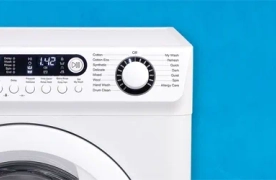1st February 2024
Being more environmentally friendly and protecting the planet is a hot topic of conversation across the UK. More people are becoming concerned with their carbon emissions and are trying to become more environmentally friendly.
But did you know that washing machines actually have a large carbon footprint? The energy used to heat water for washing machines, and other domestic appliances, accounts for 6% of all CO2 emissions in the UK.
Cheap washing machines made from cheaper materials can be much less environmentally friendly than more expensive washing machines, for a number of reasons.
One of the reasons is that, not only do cheaper washing machines have a shorter lifespan and need to be replaced sooner, but their parts are also not usually recyclable, meaning they usually end up in landfills. Recycling is a major way to become more environmentally friendly, but this may not be possible with cheaper washing machines.
Cheaper machines often have half the lifespan of more expensive machines. So as well as not being recyclable, they are also disposed of more frequently.
Cheap washing machines are also usually less efficient. Manufacturers usually install cheaper motors, in order to save on their upfront costs. Cheaper motors use more energy per wash, which can not only result in higher household bills but can also result in higher CO2 emissions.
Having a cold-fill machine, or the option to wash your clothes at a low temperature, can also significantly reduce carbon emissions. This feature is often only available on more expensive washing machines.
As well as focusing on a well-designed machine that is more environmentally friendly, Ebac also makes 87% of their washing machine components in the UK – which significantly reduces their carbon emissions.

17th March 2024
When choosing your new washing machine, you may already know what features you are looking for,...
Continue reading
17th March 2024
Here are some tips for choosing a quiet washing machine: Look at the decibels (dB) for washing...
Continue reading
12th March 2024
One of the things you sacrifice when buying a cheap machine is the type of functions you have...
Continue reading